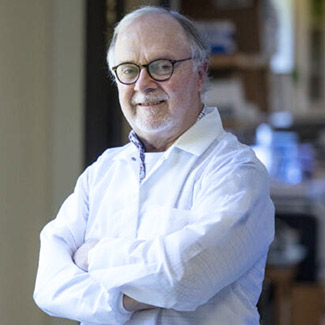UCI professor wins prestigious Robert Koch Prize for groundbreaking research
Philip Felgner shares annual award for contributions to creation of mRNA vaccines

“I’m honored to be included along with Dr. Drew Weissman for contributing to the development of mRNA technology, which shows great promise for creating vaccines to fight future pandemics and treat other infectious diseases,” said UCI professor Philip Felgner, PhD, who directs the university's Vaccine Research and Development Center. Steve Zylius / UCI
Irvine, Calif. — Philip Felgner, PhD, a professor of physiology & biophysics at the UCI School of Medicine, is one of two scholars to win the prestigious 2022 Robert Koch Prize for fundamental contributions to the transfer of nucleic acids into cells.
This pioneering technology for treating infectious diseases played a crucial role in developing the messenger RNA COVID-19 vaccines.
“This award is a great honor that I share with my team in appreciation of their dedication and commitment over the years,” said Felgner, who directs UC Irvine’s Vaccine Research and Development Center.
“Messenger RNA technology holds great promise for creating preventive vaccines that will help avoid future pandemics and fight HIV and other infectious diseases. It also offers possibilities for treating cancer and Alzheimer’s disease and correcting genetic disorders such as sickle cell disease.”
Felgner will share the prize with Dr. Drew Weissman, a professor in the University of Pennsylvania’s Perelman School of Medicine.
In announcing the prize recipients, the Robert Koch Foundation cited Felgner’s work in “the development of lipofection, a technology in which active ingredients are packaged in so-called liposomes, i.e., surrounded by a membrane that resembles the cell membrane. On contact with a cell, the membranes of the liposome and the cell fuse. This is how the active ingredient is introduced into the cell. … Liposome technology is not only the basis of modern mRNA vaccines, but also widely used in basic research and is a key technology in medicine for introducing active substances into cells.”
Felgner said, “For many years, hundreds of motivated scientists stayed committed to the belief that one day nucleic acid vaccines would mature and benefit global health. The lipid nanoparticle mRNA vaccines are a realization of that dream.”
The $130,000 (120,000 euros) prize is one of the most important scientific research awards in Germany. It will be bestowed during a formal ceremony Nov. 11 at the Berlin-Brandenburg Academy of Sciences and Humanities, in Berlin. The event, which begins at 4:30 p.m. Central European Time, will be streamed on LinkedIn at https://www.linkedin.com/company/robert-koch-stiftung and on Twitter at https://twitter.com/RKStiftung.
Last June, Felgner was one of seven international scholars to receive Spain’s Princess of Asturias Award for Technical and Scientific Research in recognition of their contributions to designing COVID-19 vaccines.
The jury citation said that the seven are “leading figures in one of the most outstanding feats in the history of science. Their work constitutes a prime example of pure research for the protection of public health the world over. Both the development of novel messenger RNA technology and the production of adenovirus-based vaccines open a path of hope for their use against other diseases.”
The $60,000 (50,000 euros) award is one of eight Asturias prizes – in such categories as the arts, social sciences, literature and sports – bestowed each year by the Princess of Asturias Foundation, named for 15-year-old Spanish Crown Princess Leonor. The formal ceremony was held Oct. 22, 2021 in Oviedo, Spain.
About the Robert Koch Foundation: The Robert Koch Foundation e.V. is a nonprofit foundation for the promotion of medical progress, founded in 1907 and based in Berlin. It promotes basic scientific research in the field of infectious diseases as well as exemplary projects to solve medical and hygienic problems. Every year, the foundation awards several high‐ranking scientific prizes: the Robert Koch Prize, which is one of the most important scientific awards in Germany, the Robert Koch Gold Medal, three awards for young scientists and, since 2013, the Prize for Hospital Hygiene and Infection Prevention.
Robert Koch (1843‐1910), after whom the prize is named, founded modern bacteriology. For this he received the Nobel Prize for Medicine and Physiology in 1905. Koch headed the Institute for Infectious Diseases in Berlin from 1891 until his retirement in 1904.
UCI Health is the clinical enterprise of the University of California, Irvine, and the only academic health system in Orange County. Patients can access UCI Health at primary and specialty care offices across Orange County and at its main campus, UCI Medical Center in Orange, Calif. The 459-bed, acute care hospital, listed among America’s Best Hospitals by U.S. News & World Report for 21 consecutive years, provides tertiary and quaternary care, ambulatory and specialty medical clinics, behavioral health and rehabilitation services. UCI Medical Center is home to Orange County’s only National Cancer Institute-designated comprehensive cancer center, high-risk perinatal/neonatal program and American College of Surgeons-verified Level I adult and Level II pediatric trauma center and regional burn center. UCI Health serves a region of nearly 4 million people in Orange County, western Riverside County and southeast Los Angeles County. Follow us on Facebook, Instagram, LinkedIn and Twitter.
About the University of California, Irvine: Founded in 1965, UCI is the youngest member of the prestigious Association of American Universities and is ranked among the nation’s top 10 public universities by U.S. News & World Report. The campus has produced three Nobel laureates and is known for its academic achievement, premier research, innovation and anteater mascot. Led by Chancellor Howard Gillman, UCI has more than 36,000 students and offers 224 degree programs. It is located in one of the world’s safest and most economically vibrant communities, and is Orange County’s second-largest employer, contributing $7 billion annually to the local economy and $8 billion statewide. Learn more about the university at www.uci.edu ›




